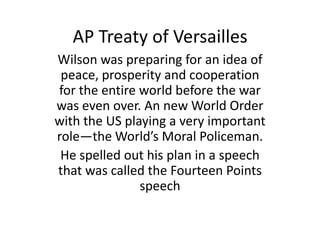
Ap treaty of versailles
- 1. AP Treaty of Versailles Wilson was preparing for an idea of peace, prosperity and cooperation for the entire world before the war was even over. An new World Order with the US playing a very important role—the World’s Moral Policeman. He spelled out his plan in a speech that was called the Fourteen Points speech
- 2. Fourteen Points • President Wilson wanted a fair peace policy.— Wilson’s plan for lasting peace: • --end to secret agreements (alliances) • --freedom of the seas • --reduction of armaments • --self determination for ethnic groups—yet no formula for how to implement it • Very progressive-like
- 3. • The most important part of his plan was a peacekeeping organization called A League of Nations—a new organization of nations that would mediate international disputes and act against aggressors—he hoped to create a world of peaceful nations in which future wars could be avoided.
- 4. Midterm Elections 1918 • The Republicans captured both houses of congress—a signal that domestic issues were more important that international issues. • Republicans were also made because Wilson will take no Republicans to Europe with him to negotiate the treaty. • Henry Cabot Lodge
- 5. Treaty of Versailles • In January 1919, a peace conference began in Paris to try to resolve the complicated issues arising from WWI. • All leaders of the countries involved were present except Germany. • The Big Four-US, Britain, France and Italy – Wilson treated like a Hero from the West
- 6. Who Died and made you King?? • Everyone else at the peace talks thought that Wilson’s plan was too easy on Germany—they wanted Germany to paid—they wanted to impose a harsh treaty on Germany. • Wilson made many concessions in order to get the support of the other Allied leaders for the creation of the League of Nations.
- 7. The US Senate Rejects the Treaty • Wilson had hoped the League of Nations would prevent future wars, but his opponents in Congress argued that it would drag the country into unnecessary military commitments. • He needed 2/3 of the Senate and rejected any compromise.
- 8. Hit the Road • Convinced that the American people were on his side, he took his case to the road. • Traveling over 8000 miles in 3 weeks, speaking up to 4 times a day, with little time to rest he had a stroke in Pueblo Co. • His wife took the reigns for over 18 months. • Unable to fight for his beloved League of Nations, and unwilling to compromise after years of total control, he refused to sign the watered down version of the Treaty.
- 9. • In the end a harsh treaty was imposed on Germany which led to resentment, economic difficulties and eventually WWII.
- 10. Why Did the Treaty not Pass? • Wilson’s stubbornness • His morality • Senator Cabot Lodge’s hatred toward Wilson • American people unwilling to take a more significant role in the world • A full commitment to the League would have surrendered American freedom on a variety of issues—bring the nation into conflicts that did not represent our vital interest or potentially erode Congress’ right to declare war.
- 11. • In the end, Americans became tired of Wilson’s moralizing and disillusioned with world affairs. The small gains made in WWI came at a terrible cost. Once again Americans heeded Washington's’ advice to avoid European entanglements and returned to isolationism. • We raised our tariffs and restricted our European immigration
- 12. WWI Results • Dissolution of 4 empires—Russian Empire, Ottoman Empire, German Empire and Austria-Hungary. • 9 new countries were formed out of these— Yugoslavia, Poland, and Czechoslovakia
- 13. Before and After
- 15. The Flu of 1918 • http://youtu.be/-yH33-2K5bo